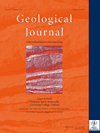
GEOLOGICAL JOURNAL
Scope & Guideline
Uncovering the planet's history with scholarly rigor.
Introduction
Aims and Scopes
- Geochemistry and Petrogenesis:
This area focuses on the chemical composition and processes that govern the formation of rocks and minerals, including studies on isotopic compositions and trace elements to understand geological history. - Geochronology:
Research in this scope employs various dating techniques, particularly U-Pb zircon dating, to establish the ages of geological formations and events, aiding in the reconstruction of Earth’s history. - Tectonic Evolution:
Papers often explore the tectonic settings and processes that shape geological structures, including subduction zones, continental collisions, and the evolution of orogenic belts. - Sedimentology and Stratigraphy:
This includes studies on sedimentary processes, depositional environments, and stratigraphic frameworks that help in understanding the geological history and resource potential of specific areas. - Paleoenvironmental Reconstruction:
Research aimed at reconstructing past environments and climates, using proxies such as sediment composition and fossil records to infer climatic conditions over geological time. - Mineralization and Economic Geology:
This scope investigates the processes leading to the formation of economically significant mineral deposits, including studies on ore genesis and the geochemical conditions that favor mineralization. - Geohazards and Risk Assessment:
This involves understanding geological hazards such as landslides, earthquakes, and volcanic activity, and assessing their impact on human activities and infrastructure.
Trending and Emerging
- Sustainable Resource Management:
There is a growing emphasis on studies that explore sustainable practices in resource extraction and management, reflecting a broader societal focus on environmental sustainability. - Climate Change Impacts:
Research addressing the geological implications of climate change, including changes in sedimentation patterns, erosion, and landscape evolution, is increasingly prevalent. - Innovative Analytical Techniques:
Emerging methodologies such as machine learning and advanced geochemical analysis are gaining traction, allowing for more sophisticated interpretations of geological data. - Integrated Environmental Assessments:
Studies that combine geological, geochemical, and ecological perspectives to assess environmental impacts and resource management are on the rise, indicating a trend towards interdisciplinary research. - Geohazards and Climate Resilience:
Research focusing on the assessment and management of geological hazards in the context of climate change is becoming more prominent, highlighting the need for resilience strategies in vulnerable regions.
Declining or Waning
- Traditional Petroleum Geology:
Papers specifically focused on conventional petroleum geology seem to be less frequent, possibly due to the industry's shift towards unconventional resources and renewable energy sources. - Palaeontology:
Although still a relevant field, the frequency of papers solely dedicated to palaeontological studies appears to be decreasing, with more emphasis on integrated geological studies that include palaeoecological insights as part of broader geological research. - Geological Mapping Techniques:
Research focused exclusively on traditional geological mapping methods is waning, as there is an increasing reliance on advanced geophysical and remote sensing techniques. - Static Resource Assessments:
There is a noticeable decline in studies that provide static assessments of geological resources, as the focus shifts towards dynamic models that incorporate environmental and sustainability considerations.
Similar Journals
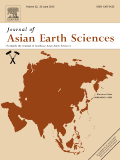
JOURNAL OF ASIAN EARTH SCIENCES
Advancing Knowledge in Earth's Dynamic Asian LandscapesJOURNAL OF ASIAN EARTH SCIENCES, published by Pergamon-Elsevier Science Ltd, is a premier international journal dedicated to advancing the understanding of Earth Sciences, particularly within the vibrant and diverse geological landscapes of Asia. With an esteemed Impact Factor reflective of its robust scholarship, the journal is currently categorized in the Q1 quartile for both Earth-Surface Processes and Geology, highlighting its significant contribution to these fields. Researchers can access cutting-edge research spanning geophysical studies, geological formations, and environmental changes via the journal’s Open Access model, ensuring a broad dissemination of knowledge. As the journal converges its focus from 1997 to 2024, it continues to serve as a critical platform for scholars, professionals, and students aiming to explore the unique challenges and opportunities present in Asian Earth sciences. Its commendable rankings of 28th out of 179 in Earth-Surface Processes and 52nd out of 321 in Geology, demonstrate its influence and relevance in the academic community.
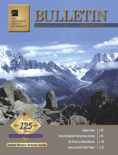
GEOLOGICAL SOCIETY OF AMERICA BULLETIN
Uncovering Geological Truths, One Bulletin at a TimeThe Geological Society of America Bulletin (GSA Bulletin), with ISSN 0016-7606 and E-ISSN 1943-2674, is a premier scholarly journal published by Geological Society of America, Inc. Based in the United States, this journal has been a cornerstone of geological research since its inception in 1890, making significant contributions to the understanding of Earth sciences over more than a century. Recognized for its rigorous peer-review process, the GSA Bulletin currently holds a prestigious Q1 ranking in Geology, positioning it among the top 14 journals in Earth and Planetary Sciences in terms of Scopus ranking, reflecting the high quality and impact of the research it publishes. Researchers, professionals, and students alike benefit from its comprehensive coverage of geological topics, including sedimentology, volcanology, and paleontology, which supports the advancement of knowledge in the geosciences. While the journal is not open access, it continues to provide a vital platform for innovative research and critical discussions that shape the future of geology.

Journal of Earth Science
Advancing knowledge in Earth and Planetary Sciences.Journal of Earth Science, published by the China University of Geosciences, Wuhan, is a leading journal in the field of Earth and Planetary Sciences, recognized for its significant contributions to the understanding of geological processes and environmental challenges. With an impressive Q1 ranking among Earth and Planetary Sciences journals and a strong position at Rank #39/195 in Scopus, this journal not only showcases high-quality research but also serves as a crucial platform for disseminating innovative findings, spanning a broad spectrum of topics from geophysics to climate change. The journal adopts an open access model, which enhances the visibility and accessibility of research articles published from 2009 to 2024, thereby facilitating collaboration and knowledge sharing among the global scientific community. With its commitment to advancing geosciences, Journal of Earth Science is invaluable for researchers, professionals, and students alike, eager to stay informed and contribute to ongoing discussions in this dynamic field.
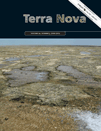
TERRA NOVA
Uncovering the Secrets of Our PlanetTERRA NOVA, published by WILEY, is a leading journal in the field of Geology, with a remarkable impact within the academic community. With the ISSN 0954-4879 and E-ISSN 1365-3121, the journal has been a pivotal platform for innovative research since its inception in 1989 and will continue its influence through to 2024. Ranked in the top tier (Q1) of its category for 2023, TERRA NOVA holds an esteemed position with a Scopus ranking of 67 out of 321 in Earth and Planetary Sciences, showcasing its dedication to high-quality, impactful scientific discourse. The journal covers a diverse range of topics within geology, providing valuable insights for environmental scientists, geologists, and industry professionals. By fostering an interdisciplinary approach, TERRA NOVA remains committed to advancing the understanding of geological processes and their implications for society. With a dedicated readership of researchers, professionals, and students, this journal is essential for those looking to stay abreast of the latest developments and trends in the field.
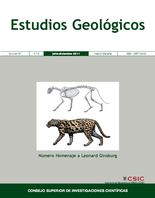
ESTUDIOS GEOLOGICOS-MADRID
Bridging Academia and Geology for Global Impact.ESTUDIOS GEOLOGICOS-MADRID is a prominent journal in the field of geology, published by the esteemed Consejo Superior de Investigaciones Científicas (CSIC) in Spain. Established in 1976, this Open Access journal has been a vital resource for researchers and professionals since its inception. With an impact factor reflecting its contribution to the Earth and Planetary Sciences community, ESTUDIOS GEOLOGICOS-MADRID currently holds a Q3 category ranking in Geology as of 2023, showcasing its relevance and quality within the discipline. The journal publishes a diverse array of geological studies, ensuring wide-reaching access to significant research findings, thereby promoting collaboration and knowledge sharing. Established as a platform for both foundational research and applied geology, this journal fosters academic growth and contributes to understanding the Earth’s processes. Researchers, professionals, and students are encouraged to explore its extensive archive, which includes publications from 1976 to the present. For more information, visit the journal's editorial office at Editorial CSIC, C/VITRUVIO 8, 28006 MADRID, SPAIN.
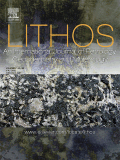
LITHOS
Innovating Insights into Earth's Composition.LITHOS is a prestigious academic journal published by Elsevier, renowned for its contributions to the fields of Geochemistry and Petrology. As an integral platform since 1968, this journal focuses on advancing the understanding of the Earth's composition and processes, adhering to the highest academic standards as evidenced by its Q1 ranking in both Geochemistry and Petrology, and Geology. With an impressive impact factor and substantial visibility in scientific databases, LITHOS caters to a broad audience, including researchers and students eager to engage with cutting-edge studies. Although it is not an open-access journal, its scholarly rigor and relevance have established it as a leading resource for the latest findings and methodologies in Earth sciences. Notably, it ranks #41 in Earth and Planetary Sciences: Geology and #34 in Geochemistry and Petrology, demonstrating its significant influence within the academic community. The journal is based in the Netherlands and continuously opens avenues for innovative research through its commitment to excellence in the geosciences.
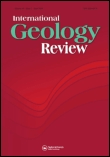
INTERNATIONAL GEOLOGY REVIEW
Connecting researchers to the forefront of geological innovation.INTERNATIONAL GEOLOGY REVIEW, published by Taylor & Francis Inc, is a premier journal dedicated to advancing the field of geology since its inception in 1959. With its Q1 ranking in the field of Geology for 2023, this journal is a significant platform for researchers, professionals, and students exploring the intricacies of Earth and planetary sciences. The journal has been rated in the 81st percentile within Scopus rankings, reflecting its influence and the high quality of articles published. Although it does not offer Open Access options, the journal maintains a rigorous peer-review process to ensure the publication of original and impactful research. With an extensive archive projected to continue until 2024, INTERNATIONAL GEOLOGY REVIEW serves as an essential resource for those seeking to deepen their understanding of geological phenomena, making it a vital contributor to the global scientific community.

ANNALES SOCIETATIS GEOLOGORUM POLONIAE
Pioneering Research in Economic Geology and Beyond.ANNALES SOCIETATIS GEOLOGORUM POLONIAE is a distinguished journal published by the Polish Geological Society, focusing on pivotal research in the fields of geology, economic geology, and stratigraphy. With an ISSN of 0208-9068, this journal has established itself as an essential platform for disseminating significant findings and advancements in geological sciences since its convergence in 2008. The journal proudly holds a Q2 quartile ranking in the categories of Economic Geology, Geology, and Stratigraphy as of 2023, indicating its respectable position within the global academic community. Researchers will find its indexed status in Scopus, ranking #138/321 in Geology and showcasing a solid presence in key geological sub-disciplines. While the journal is not open access, it remains a vital resource for professionals and students striving for insight into contemporary geological research. Located in Krakow, Poland, the journal continues to contribute significantly to the understanding of geological processes and resources, making it an indispensable reference for anyone in the field.

Solid Earth Sciences
Transforming knowledge into action for Earth's future.Solid Earth Sciences is a dynamic open-access journal published by Elsevier, dedicated to advancing our understanding of the Earth's subsurface processes and materials. Since its inception in 2016, the journal has established itself as a vital resource for researchers and professionals in the fields of geochemistry, petrology, geology, geophysics, and geotechnical engineering, achieving a notable Q2 ranking in multiple categories as of 2023. With an ISSN of 2451-912X, the journal aims to disseminate high-quality research that enhances knowledge of earth surface processes and the intricate interactions within our planet's systems. The journal is indexed in Scopus, showcasing an impressive rank in various sub-disciplines, with a rank of #96 in Geology and a noteworthy percentile in Earth and Planetary Sciences. Solid Earth Sciences offers a platform for innovative studies, comprehensive methodologies, and cutting-edge technological advancements that cater to a global audience of scientists, academics, and students. With its commitment to open access, it fosters wider dissemination and impact of research outcomes, ensuring that pivotal discoveries reach stakeholders and contribute to real-world applications.
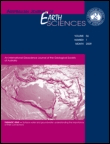
AUSTRALIAN JOURNAL OF EARTH SCIENCES
Fostering a Community of Earth Science InnovatorsAustralian Journal of Earth Sciences, published by Taylor & Francis Ltd, has established itself as a leading journal in the field of Earth and Planetary Sciences since its inception in 1984. With an impactful reach reflected in its ranking as Q2 in the Earth and Planetary Sciences category, the journal contributes significantly to the advancement of knowledge through rigorous peer-reviewed research. While it is not Open Access, the journal ensures broad accessibility through institutional subscriptions and various academic platforms. With a commitment to covering diverse topics within the Earth sciences, including geosciences, geology, and environmental studies, the Australian Journal of Earth Sciences is an essential resource for researchers, professionals, and students seeking to deepen their understanding of the dynamic processes that shape our planet. Engaging with the journal means being part of a vibrant community that aspires to push the boundaries of scientific inquiry and innovation in Earth sciences.